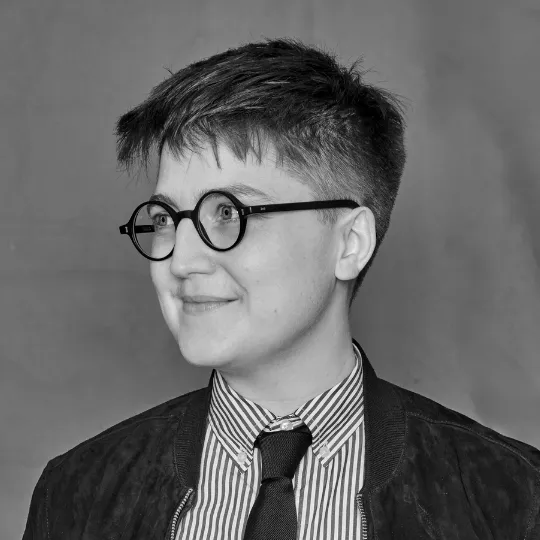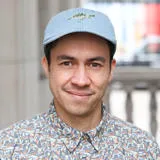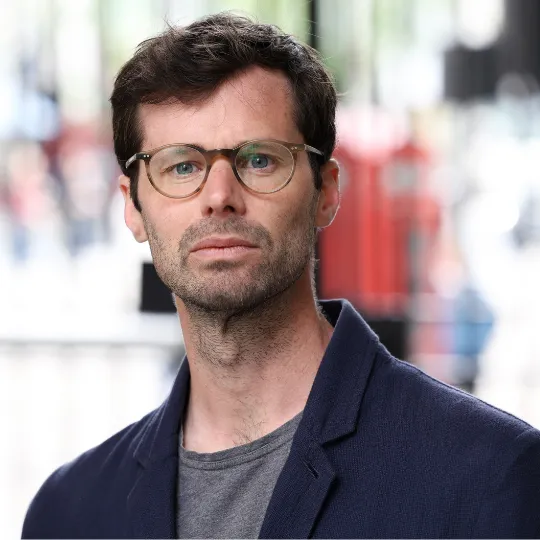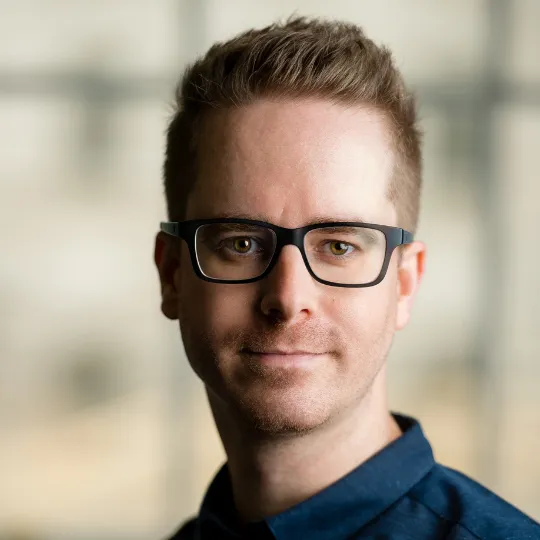28 September 2017
New Staff in Digital Humanities for 2017-18
The Department of Digital Humanities welcomes 12 new staff members for 2017-18.

We are delighted to welcome 12 new members of staff to the Department of Digital Humanities at King’s College London.
Our new colleagues bring a wide range of expertise and experience to the department, including new media theory, digital methods, digital sociology, participatory culture, social networks, digital cultural heritage, data economies and industries, and the politics of data, platforms and artificial intelligence. This will build on and complement our existing strengths as one of the UK’s leading departments for research, teaching and innovation in digital humanities and digital studies.
If you’re interested in studying or collaborating with us, please do get in touch.
Bernard Geoghegan, Senior Lecturer in History and Theory of Digital Media
Bernard Dionysius Geoghegan is a media theorist and historian of technology with a particular interest in how digital media—as ensembles of practice, instrument, and inscription—interweave with science, aesthetics, and the environment to form cultural technologies. His work rests on a conception of digital technologies as transmedial and as formed through an ongoing composition of living bodies, platforms, and writing systems into hybrid assemblages. His book manuscript From Information Theory to French Theory (under review) examines how scientific and political strategies shaped the incorporation of digital epistemologies into the humanities and social sciences between 1930 and 1970, particularly in structuralist and poststructuralist theories. He is currently co-authoring a book with Francesco Casetti on screening as a cultural technique that examines the history of managing environments and space through screen-based media technologies such as radar and global positioning systems. This book project intersects with his work as a curator for the Anthropocene and Technosphere projects at the Haus der Kulturen der Welt in Berlin, Germany. His website is www.bernardg.com. He may be found on Twitter at @bernardionysius.
Brittany Kelley, Teaching Fellow in Digital Cultures
Brittany completed her PhD at the University of Louisville in Kentucky, USA, where she wrote about online fanfiction and literacy practices in her dissertation, To My Betas, Endless Chocolate Frogs!: Exploring the Intersections of Emotion, the Body, and Literacy in Online Fanfiction. While in graduate school, she taught courses on writing and business communication. She then worked as an Assistant Professor of English and Writing Centre Director at the University of Jamestown in North Dakota, USA, where she developed a new service for students, faculty, and staff to talk about their various writing projects, including their successes and challenges. At Kings College, she will continue to develop her work into fan studies and effective and ethical online research methodologies.
Clara Bradbury-Rance, Liberal Arts Early Career Development Fellow in Digital Culture
Clara joined King’s in September 2017 as an Early Career Fellow in the interdisciplinary Liberal Arts department, with a research and teaching base in Digital Humanities. She has a PhD in Screen Studies from the University of Manchester (2016). Clara’s work uses feminist and queer theory to explore contemporary cinema, digital media and the politics of visual culture. Her first monograph, based on her PhD, will be published by Edinburgh University Press. Troubling Visibility: The Queerness of Lesbian Cinema considers the simultaneous increase in lesbian visibility on the twenty-first century cinema screen and the shift away from identity categories in critical discourses of sexuality. Her new research project considers how media transformations have generated contemporary models of feminist citation and reinvigorated commitments to a collective political agenda. This research explores feminist cultural production through new modes of online distribution, the relationship between celebrity culture and activist movements, the cultural and political dynamics of social media and mythologies of US dominance in transnational feminisms.
Cornelia Reyes Acosta, Lecturer in Digital Methods
Cornelia is a Lecturer in Digital Methods and joined the Department of Digital Humanities in December 2016. She holds a PhD from the London School of Economics, where she worked on the significance of digitally mediated social ties in achieving recognition in the field of cultural and creative production. Cornelia’s main research interest is in digitally mediated social interaction and social networks. She is particularly interested in tracing the impact of digital technology on personal social relationships and the emergence of trust. At King’s Cornelia will focus on understanding affordances of online social networking platforms alongside individuals’ motivation to building and sustaining meaningful social ties online. Cornelia is on Twitter at @reyes_cornelia.
Graeme Earl, Professor of Digital Humanities
Graeme is fascinated by the ways in which cultural heritage and digital technologies collide. He has worked on a broad range of archaeological, digital humanities, digital economy and web science projects. These include supporting the positive contributions that digital transformations can make in terms of access to cultural heritage, recording and analysis of material culture, and the links between digital humanities and the digital creative sector. He also has a passion for MOOCs and their critique, including their implications for open scholarly communication.
Graeme is currently a Visiting Professor in the Graduate School of Media Design at Keio University in Japan. Since 2005 the majority of his activities have been focused in Italy at the Roman archaeological site of Portus, the port of Imperial Rome. Here he has experimented with different forms of digital humanities research and teaching, including imaging, interaction design, online learning design, augmented and virtual reality, computer vision, accessibility, research repositories, electronic publication, geographic information systems, survey and remote sensing. At King’s he will focus on the broader implications of technology for the ways in which the Arts and Humanities engage with the past, and of the impact of cultural heritage discourses on digital innovation. He is on Twitter at @GraemeEarl.
Jennifer Pybus, Lecturer in Digital Culture and Society
Jennifer’s research focuses on diverse ways in which our digital lives are being datafied, turned into social big data that fuels our increasingly personalised, data intensive economy. More specifically, she is interested in questions around youth and privacy which relate to how third party ecosystems found on social media platforms are transforming the advertising industry via the rise of data analytics and algorithmic processes. Her current research looks at the politics of datafication and everyday life, specifically in relation to those critical points of tension that lie at the intersections between digital culture, Big Data and emerging advertising and marketing practices. Part of this work focuses on the political economy of third party ecosystems on social media platforms, display ad economies, the analytics of search engine optimization and the rise of new sites wherein data can be exchanged for value. Her website is jenniferpybus.org and she is on Twitter at: @jrprybus
Jonathan Gray, Lecturer in Critical Infrastructure Studies
Jonathan Gray is Lecturer in Critical Infrastructure Studies at the Department of Digital Humanities, King's College London. He is writing a book on Data Worlds and his current research focuses on the politics and social life of public data. He is also Co-Founder of the Public Data Lab; Research Associate at the Digital Methods Initiative (University of Amsterdam) and Research Associate at the médialab (Sciences Po, Paris). More about him can be found at jonathangray.organd he is on Twitter at @jwyg.
Marta Musso, Teaching Fellow in Digital Asset and Media Management & Digital Curation
Marta Musso is a researcher in digital humanities and history. She works on the preservation of digital-born sources and internet archives, digitisation processes, new methods of historical research for digital data, web history, energy policies and development. She holds a PhD in economic history from the University of Cambridge, and she works on the history of the oil industry and of the digital revolution. In 2016/2017 she was Max Weber Fellow at the European University Institute, where she worked on the history of European energy policies.
Mike Duggan, Visiting Lecturer in Digital Culture
Mike is a visiting lecturer in digital culture, where he teaches on the Digital Foundations, Theories of New Media and Big Data, Culture and Society modules. He is interested in the complex intersections that unfold between digital technologies and cultural practices in everyday life. He has a PhD in cultural geography, which examined everyday mapping practices in the digital age. Currently his research interests are focused on everyday mapping practices, digital mapping technologies, neuro-mapping practices and digital ethnography. Mike is the events coordinator for the Living Maps journal and is currently in the process of developing research outputs from his PhD dissertation. He is on Twitter at @mikeduggan4
Nick Srnicek, Lecturer in Digital Economy and Culture
Nick is a Lecturer in Digital Economy in the Department of Digital Humanities. Currently he is finishing writing (with Helen Hester) a book on the intersection between anti-work politics and social reproduction. His next project will be on the political economy of artificial intelligence. Broadly speaking, Nick’s research is interested in the interactions between changes in economies, changes in technology, and changes in political organisation. His work has attempted to analyse both the threats and opportunities that are emerging from our new digital landscape, and to outline potential ways forward for radical politics. He has written books on the potential opportunities of contemporary automation, as well as the emerging platform monopolies of the digital economy, and has published peer-reviewed papers on French philosophy and the use of economic modelling in central banks. The products of this research – a series of books, articles, and a manifesto – have been translated into over 20 languages. He is on Twitter at @n_srnck.
Peter Chonka, Teaching Fellow in Digital Cultures
Peter Chonka’s PhD research focused on transnational Somali-language media networks and their impact on political identity and state reconstruction in the Horn of Africa. His recent publications have explored the production, dissemination and utilisation of particular types of digital texts in this media ecology, and online/offline contestation between state security forces and militant opposition groups. He has previously been teaching in the fields of African Politics and Development Studies at SOAS and Birkbeck (University of London). Prior to his doctoral research he worked for the International Committee of the Red Cross, primarily in places of detention across Somalia. He is on Twitter at @petechonka.
Rebecca Saunders, Teaching Fellow in Digital Cultures
Rebecca Saunders lectures on the MA in Digital Culture and Society and teaches on a range of modules for the BA in Digital Culture. She is writing a book on digital pornography and sex as postindustrial labour, and a number of articles on computer generated pornography and queer and postcolonial literature. She began her academic career in English Literature at the University of St Andrews, and completed her MA and PhD at King’s College, during which time she blended her interests in queer and feminist theory with digital culture.







